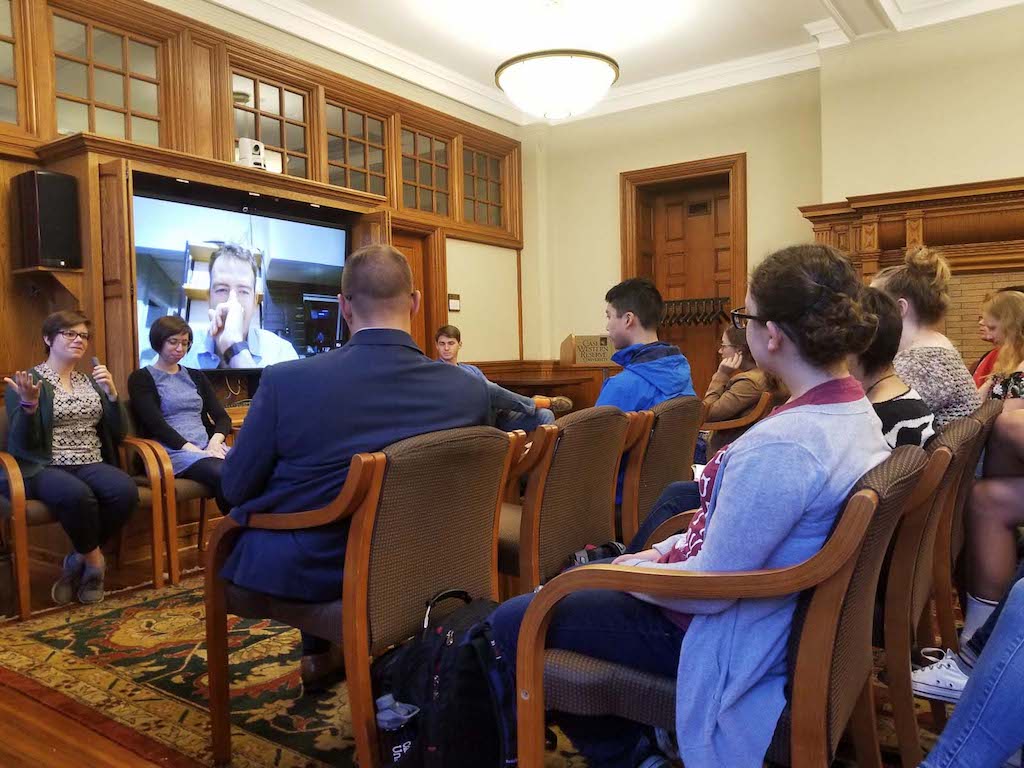Alumni panel discusses the benefits of a humanities degree
In an environment geared toward hard science and pre-professional programs, it can be hard to see the benefit of studying the humanities.
Five Case Western Reserve University alumni were brought together on Monday, Oct. 2 for a panel discussion on working with a humanities degree.Two of the panelists were local, two were present via Skype, and one drove all the way from Washington D.C.
Gilad Salomon, video calling from Sao Paulo, Brazil, organized the panel this year. His goal was to bring in young graduates to talk about how studies in the humanities influenced their career paths; each alumnus gave a five minute summary of how their studies led to their current jobs.
Salomon, who graduated in 2010 with a major in history and a minor in economics, started off the discussion by explaining why he graduated a year late. After three years of business classes and studying abroad in Spain, he realized that he could learn everything he needed to know about business on his own and would rather focus on what he was interested in: History. Taking over 30 history credits in just two semesters, he effectively abandoned the majority of the credits he earned in business. He successfully got the first job he applied to, a position in the multibillion dollar company, Bloomberg L.P., because they valued a candidate without just the typical accounting or finance degree. In fact, Salomon didn’t know the first thing about finance when he started, but was able to quickly learn on the job, which he attributes to his studies in humanities.
“Emotional intelligence [learned through the humanities] is the one piece missing beyond the surface in most qualified candidates,” Salomon said, “Emotional intelligence [gives] the ability to sympathize and empathize with others and the ability to judge the environment well in order to act properly.”
He quit his job at Bloomberg to seize an opportunity in Brazil where he became the head of marketing for Latin America. He parted with some words of wisdom, saying that “the most important thing is to graduate with an open mind and emotional intelligence.”
Violette S. Robinson, who graduated with a masters in French and a bachelors in marketing and communications, became interested in finances after graduating and quickly secured a job as the financial planner for Skylight Financial Group. She wanted to break her family cycle of poor financial decisions by becoming educated in matters of economics. She went from struggling financially to becoming a financial planner with no previous experience in the field.
Additionally, to become licensed with other new hires, all of whom had degrees in finance, she needed to take a test, which she passed on the first try. All of the other hires had to retake it at least once. She believes her studies of the humanities helped her to think critically to come up with the best answers to the questions.
“Humanities majors have greater emotional intelligence and therefore are a better return on investment,” Robinson said. “They are able to think critically, are very reliable and hardworking.”
Victoria Hernada, who video called from the University of Virginia where she is studying law, graduated from CWRU in 2013 with a degree in music history. She also studied abroad in Hamburg, Germany where she earned her masters in European studies.
She argues that “language skills are as important as analytical skills.” She was surprised when she knew more about the history of the European Union and its laws than most of local peers studying law in Hamburg, because of her humanities degree.
Graduating from CWRU with a major in religious studies and electrical engineering, Eric Helsh realizes that most see his majors as an odd combination, but he disagrees.
“The further away majors are, the more the whole brain is worked,” Helsh said, “Rather than just getting one lense on the world, two very different majors gives you two very different [points of view].”
To add to his uniqueness, Helsh occasionally works in Alaska where he teaches fly fishing and leads bear spotting tours. He ended up getting a position as a software engineer with no previous experience and says that here, his religious studies degree was more critical to his success than electrical engineering. He was able to use his critical thinking experiences from religious studies to learn how to program quickly.
The forum ended with a quick question-and-answer session. All emphasized in this section that it is more important to speak languages fluently than to have a minor or major in them.
In addition, Salomon said, “Humanities teaches you how to adapt better to your environment … how to sympathize and empathize … [which] is applicable to any job.”
Helsh added that money should be no object to what you want to study.
He said, “If you are good at it you will get a job with it.”


